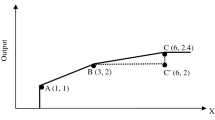Abstract
The super-efficiency data envelopment analysis (DEA) model is obtained when a decision making unit (DMU) under evaluation is excluded from the reference set. This model provides for a measure of stability of the “efficient” status for frontier DMUs. Under the assumption of variable returns to scale (VRS), the super efficiency model can be infeasible for some efficient DMUs, specifically those at the extremities of the frontier. The current study develops an approach to overcome infeasibility issues. It is shown that when the model is feasible, our approach yields super-efficiency scores that are equivalent to those arising from the original model. For efficient DMUs that are infeasible under the super-efficiency model, our approach yields optimal solutions and scores that characterize the extent of super-efficiency in both inputs and outputs. The newly developed approach is illustrated with two real world data sets.
Similar content being viewed by others
References
Andersen P and Petersen NC (1993). A procedure for ranking efficient units in data envelopment analysis. Mngt Sci 39: 1261–1264.
Banker RD, Charnes A and Cooper WW (1984). Some models for estimating technical and scale efficiencies in data envelopment analysis. Mngt Sci 30: 1078–1092.
Banker RD, Das S and Datar SM (1989). Analysis of cost variances for management control in Hospitals. Res Gov Nonprofit Account 5: 268–291.
Charnes A, Cooper WW and Rhodes E (1978). Measuring the efficiency of decision making units. Eur J Opl Res 2: 429–444.
Chen Y (2004). Ranking Efficient Units in DEA. Omega 32: 213–219.
Chen Y (2005). Measuring super-efficiency in DEA in the presence of infeasibility. Eur J Opl Res 161: 545–551.
Cook WD, Seiford LM and Zhu J (2004). Models for performance benchmarking: Measuring the effect of e-business activities on banking performance. Omega 32: 313–322.
Dulá JH and Hickman BL (1997). Effects of excluding the column being scored from the DEA envelopment LP technology matrix. J Opl Res Soc 48: 1001–1012.
Färe R and Grosskopf S (1992). Malmquist productivity indexes and Fisher ideal indexes. Econ J 102: 158–160.
Lovell CAK and Rouse APB (2003). Equivalent standard DEA models to provide super-efficiency scores. J Opl Res Soc 54: 101–108.
Rousseau JJ and Semple JH (1995). Two-person ratio efficiency games. Mngt Sci 41: 435–441.
Seiford LM and Zhu J (1998a). An acceptance system decision rule with data envelopment analysis. Comput Opns Res 25: 329–332.
Seiford LM and Zhu J (1998b). Sensitivity analysis of DEA models for simultaneous changes in all the data. J Opl Res Soc 49: 1060–1071.
Seiford LM and Zhu J (1999). Infeasibility of super-efficiency data envelopment analysis models. Infor 37: 174–187.
Zhu J (1996). Robustness of the efficient DMUs in data envelopment analysis. Eur J Opl Res 90: 451–460.
Acknowledgements
The authors are grateful to the comments and suggestions by an anonymous reviewer. Professor Liang wishes to thank the support by the NSFC of China (Grant No. 70525001).
Author information
Authors and Affiliations
Corresponding author
Rights and permissions
About this article
Cite this article
Cook, W., Liang, L., Zha, Y. et al. A modified super-efficiency DEA model for infeasibility. J Oper Res Soc 60, 276–281 (2009). https://doi.org/10.1057/palgrave.jors.2602544
Received:
Accepted:
Published:
Issue Date:
DOI: https://doi.org/10.1057/palgrave.jors.2602544




